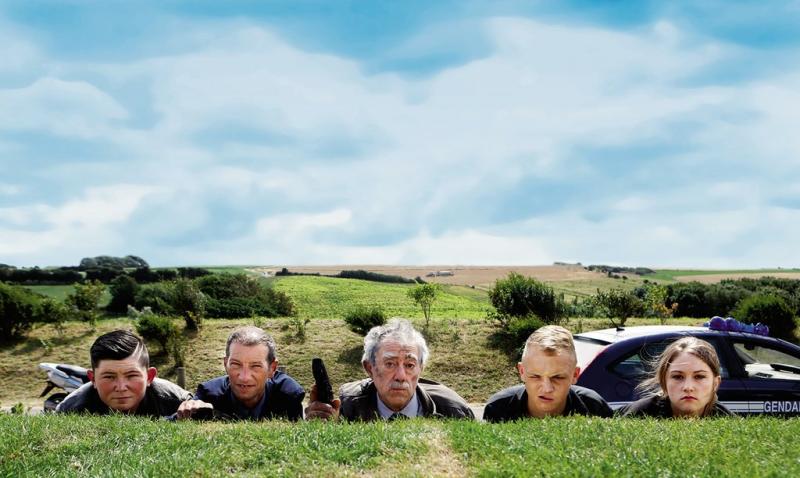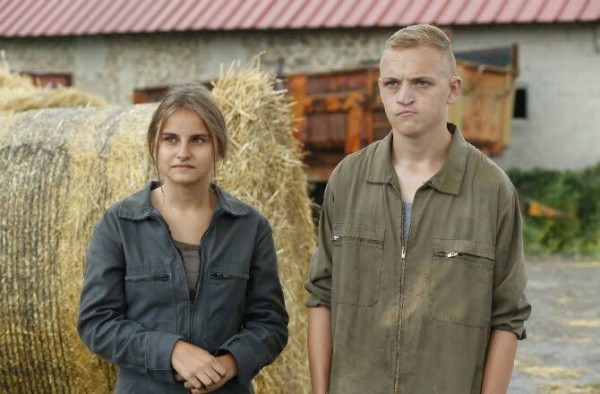Coincoin and the Extra-Humans review – God's gunk | reviews, news & interviews
Coincoin and the Extra-Humans review – God's gunk
Coincoin and the Extra-Humans review – God's gunk
Bruno Dumont's irresistible sequel to 'P'tit Quinquin' splatters rural French bigotry

It’s no accident that the eponymous young antihero of Coincoin and the Extra-Humans loses his virginity to the daughter of a French white nationalist in a field close to a sewage farm.
Hopefully, the story of the Pas-de-Calais farmer’s son Coincoin (Alane Delhaye) with the misshapen nose, formerly Quinquin, his beloved neighbour and ex-girlfriend Eve (Lucy Caron), and his fellow troublemaker Fatso (Julien Bodard), formerly Kevin, will run and run, like Michael Apted’s Up documentary series. It would depend, of course, on their continuing interactions with their sometime adversary Van der Weyden (Bernard Pruvost) – the tic-afflicted gendarmerie captain-cum-alarmist philosopher as incompetent as Inspector Clouseau, as physically challenged as Jacques Tati – and his loyal, stunt-driving number two, Carpentier (Philippe Jury).
It’s hard to believe these bumbling detectives haven’t been fired since they failed to solve a series of grisly murders in their coastal village six years previously, or to have prevented Quinquin and his friends from terrorizing an Arab boy who eventually shot himself, an echo of the young white protagonist’s murder of a North African romantic rival in Dumont’s 1997 debut La Vie de Jésus. In each film, Islamophobia was stoked by male sexual paranoia.
No less scathing of ingrained racism in France during the ongoing migrant and immigration crisis, Coincoin is presented by Dumont as a neo-pastoral mash-up of alien and zombie films and TV (think Invasion of the Bodysnatchers, the Canal Plus series Les Revenants, and the Japanese movie Before We Vanish). The lovely nonsense unfolds against the backdrop of Guillaume Deffontaines’ Corot-like widscscreen vistas, the landscape – a key character – staring implacably back at Coincoin and Eve (pictured below), who are its peasant progeny, when they scrutinize it (ie., look directly at the camera).
 Neo-pastoralism in this case involves the splattering of the countryside by what resemble giant cowpats but are, in fact, reeking globs of magma dispatched, apparently, from an unseen hostile alien ship or presence. Bubbling pools of this mysterious muck send up illuminated drones that zap select victims, causing them to inflate and spawn identically dressed clones.
Neo-pastoralism in this case involves the splattering of the countryside by what resemble giant cowpats but are, in fact, reeking globs of magma dispatched, apparently, from an unseen hostile alien ship or presence. Bubbling pools of this mysterious muck send up illuminated drones that zap select victims, causing them to inflate and spawn identically dressed clones.
Since two of the targeted locals espouse racial intolerance – Van der Weyden and the young organizer D’nis (Nicolas Leclaire) of the Rassemblement national-inspired organization Le Bloc – the idea is that bigotry begats bigotry. It’s an extra irony that the gunking tars their faces black, invoking showbusiness’s most pernicious use of greasepaint. Dumont’s trenchant verbal coup de grâce is Van Der Weyden’s gleeful seizing on the word “extra-terrestrial” to describe both the magma and groups of wandering black immigrants, whom the detective nastily puts to flight by firing his handgun in the air.
It’s a measure of Dumont’s confidence as a relatively new master of deadpan comedy that he integrates seamlessly into a world of agrarian people, whose lives, customs, and physiognomies still bear a Flemish medieval influence, such phenomena as the alien drones and their sky dumps – the deity in the director’s chair passing judgment on racists like Van Der Weyden and Carpentier and malign nativists like D’nis.
The latter has hired Quinquin and Fatso to spend part of their summer vacation illegally pasting up Bloc posters, the meaning of which they’re too dumb to question. When, with three other boys, they travel in a pickup truck to Calais to evict immigrants dwelling in a tunnel, they merely walk through it, a friendly black female toddler tagging along beside Coincoin. They then rough up their companions for laughing at Fatso’s suggestion that Coincoin has acquired a “girlfriend".
Frustrated by the doleful Eve’s romance with the farm labourer Corinne (Priscilla Benoist) – whom the typically obtuse Van der Weyden mistakes for a man – Coincoin shocks himself by winning the affections of the fierce and alluringly urban teenage newcomer Jenny (Alexia Depret).
 Vacationing in the village with her dad, Le Bloc’s tough-guy regional leader, Jenny is as unsmiling as Eve, but she enables Coincoin to make the leap into manhood, sort of, near that sewage plant – an insignificant occurrence, she snaps at him soon afterward, that doesn’t mean they’re "married".
Vacationing in the village with her dad, Le Bloc’s tough-guy regional leader, Jenny is as unsmiling as Eve, but she enables Coincoin to make the leap into manhood, sort of, near that sewage plant – an insignificant occurrence, she snaps at him soon afterward, that doesn’t mean they’re "married".
Will Coincoin and Eve find each other again? We need to know that as much as audiences needed to know if Marius would end up with Fanny in Marcel Pagnol’s 1931-36 Marseilles Trilogy. (Classic American silent comedy is probably more to Dumont's taste – Coincoin twice pays homage to the most outrageous stunt in Buster Keaton's 1928 Steamboat Bill Jr., but without risking his actors' lives.)
More pressing than teen love, even, is Van der Weyden’s need to solve the mystery of the proliferating clones. They include three whose progenitors were seemingly chosen by aliens as dangerously conservative as the supporters of Marine Le Pen: poor Eve (zapped because she’s having a same-sex relationship?), Coincoin’s mentally and physically disabled Uncle Dany (Jason Civot), and the carnival drum major Lebleu (Christophe Verheecke), possibly picked for his obesity or his inability to stand up to his hectoring wife.
That Van der Weyden’s clone is among them is complicated. In doing farcical battle with his double in a graveyard, Van der Weyden (pictured in foreground, above, with Charpentier) casts doubts on the nature of his sociopolitical identity. He’s a xenophobe and a homophobe, one who speaks scornfully of "those homosexuals" Eve and Corinne after he and Carpentier give them a protective lift home in their car. Yet there are inklings of fellow-feeling in this quizzical veteran cop. Gazing at a refugee camp before walking home one evening, he tells the dismissive Carpentier that it's hard to live close to so much suffering, the most revealing line in the film.
Like the unformed nitwit Coincoin, Van Der Weyden is not evil incarnate, but a fool who holds repugnant views – received from his culture and unexamined – yet one who is capable of compassion. In making the boy, the cop, and their cohorts tremendous fun to watch, Dumont seduces us into interrogating our own identities and outlooks, to see what dirt festers within.
rating
Explore topics
Share this article
The future of Arts Journalism
You can stop theartsdesk.com closing!
We urgently need financing to survive. Our fundraising drive has thus far raised £49,000 but we need to reach £100,000 or we will be forced to close. Please contribute here: https://gofund.me/c3f6033d
And if you can forward this information to anyone who might assist, we’d be grateful.

Subscribe to theartsdesk.com
Thank you for continuing to read our work on theartsdesk.com. For unlimited access to every article in its entirety, including our archive of more than 15,000 pieces, we're asking for £5 per month or £40 per year. We feel it's a very good deal, and hope you do too.
To take a subscription now simply click here.
And if you're looking for that extra gift for a friend or family member, why not treat them to a theartsdesk.com gift subscription?
more Film
 The Mastermind review - another slim but nourishing slice of Americana from Kelly Reichardt
Josh O'Connor is perfect casting as a cocky middle-class American adrift in the 1970s
The Mastermind review - another slim but nourishing slice of Americana from Kelly Reichardt
Josh O'Connor is perfect casting as a cocky middle-class American adrift in the 1970s
 Springsteen: Deliver Me From Nowhere review - the story of the Boss who isn't boss of his own head
A brooding trip on the Bruce Springsteen highway of hard knocks
Springsteen: Deliver Me From Nowhere review - the story of the Boss who isn't boss of his own head
A brooding trip on the Bruce Springsteen highway of hard knocks
 The Perfect Neighbor, Netflix review - Florida found-footage documentary is a harrowing watch
Sundance winner chronicles a death that should have been prevented
The Perfect Neighbor, Netflix review - Florida found-footage documentary is a harrowing watch
Sundance winner chronicles a death that should have been prevented
 Blu-ray: Le Quai des Brumes
Love twinkles in the gloom of Marcel Carné’s fogbound French poetic realist classic
Blu-ray: Le Quai des Brumes
Love twinkles in the gloom of Marcel Carné’s fogbound French poetic realist classic
 Frankenstein review - the Prometheus of the charnel house
Guillermo del Toro is fitfully inspired, but often lost in long-held ambitions
Frankenstein review - the Prometheus of the charnel house
Guillermo del Toro is fitfully inspired, but often lost in long-held ambitions
 London Film Festival 2025 - a Korean masterclass in black comedy and a Camus classic effectively realised
New films from Park Chan-wook, Gianfranco Rosi, François Ozon, Ildikó Enyedi and more
London Film Festival 2025 - a Korean masterclass in black comedy and a Camus classic effectively realised
New films from Park Chan-wook, Gianfranco Rosi, François Ozon, Ildikó Enyedi and more
 After the Hunt review - muddled #MeToo provocation
Julia Roberts excels despite misfiring drama
After the Hunt review - muddled #MeToo provocation
Julia Roberts excels despite misfiring drama
 London Film Festival 2025 - Bradley Cooper channels John Bishop, the Boss goes to Nebraska, and a French pandemic
... not to mention Kristen Stewart's directing debut and a punchy prison drama
London Film Festival 2025 - Bradley Cooper channels John Bishop, the Boss goes to Nebraska, and a French pandemic
... not to mention Kristen Stewart's directing debut and a punchy prison drama
 Ballad of a Small Player review - Colin Farrell's all in as a gambler down on his luck
Conclave director Edward Berger swaps the Vatican for Asia's sin city
Ballad of a Small Player review - Colin Farrell's all in as a gambler down on his luck
Conclave director Edward Berger swaps the Vatican for Asia's sin city
 London Film Festival 2025 - from paranoia in Brazil and Iran, to light relief in New York and Tuscany
'Jay Kelly' disappoints, 'It Was Just an Accident' doesn't
London Film Festival 2025 - from paranoia in Brazil and Iran, to light relief in New York and Tuscany
'Jay Kelly' disappoints, 'It Was Just an Accident' doesn't
 Iron Ladies review - working-class heroines of the Miners' Strike
Documentary salutes the staunch women who fought Thatcher's pit closures
Iron Ladies review - working-class heroines of the Miners' Strike
Documentary salutes the staunch women who fought Thatcher's pit closures
 Blu-ray: The Man in the White Suit
Ealing Studios' prescient black comedy, as sharp as ever
Blu-ray: The Man in the White Suit
Ealing Studios' prescient black comedy, as sharp as ever

Add comment